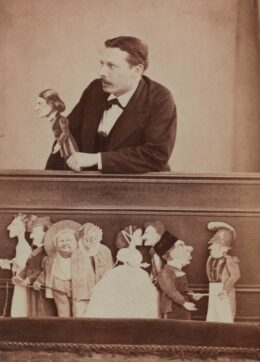
Printed
18 pages
Author(s)
Les Fourberies de M. Prudhomme
The play Les Fourberies de M. Prudhomme (M. Prudhomme’s Trickeries) is part of the volume Paris-Pantin : deuxième série des “Pupazzi” (Paris-Puppet: second instalment of the “Pupazzi”) published in 1868. In this book, the plays are preceded by several prologues, often improvised by Lemercier de Neuville before his performances.
As was the case in the two instalments of the first Pupazzi series (1866), the author includes contemplations of his time, portraits of personalities and accounts of recent events; for instance, one of the main characters is named Benoiton as a nod to Victorien Sardou (also mentioned in Les Fourberies de M. Prudhomme) and to his comedy in five acts La Famille Benoîton (The Benoîton Family) performed for the first time in Paris at the Théâtre du Vaudeville in 1865. Later, the proper noun “Benoîton” gave the adjective “benoîton” used in French to refer to wealthy people who exchanged their values for material wealth.
Monsieur Prudhomme is an emblematic character created by Henry Monnier (1799-1877), a French illustrator, caricaturist, and playwright. This character is a satire of the bourgeois man of Monnier’s time, symbolising the pretentiousness, rigid morality and conservative mind of the bourgeoisie during the first half of the 19th century.
A man plans a wedding for his son
M. Prudhomme visits Madame Benoiton and asks for her youngest daughter’s hand for his son. At first, Madame Benoiton mistakes him for a merchant. Once his identity cleared up, Madame Benoiton suggests for them to talk and to get to know each other.
During their conversation, she questions him on famous personalities and authors such as Victorien Sardou, Poquelin, Dumas fils, Octave Feuillet, Émile de Girardin, Ponson du Terrail and Timothée Trimm. The conversation, now light and mundane, is punctuated by dances: Madame Benoiton seems charmed by M. Prudhomme, thanks to his manners and his answers.
M. Prudhomme does his best to give a good impression and assures that “like father like son”. The conversation continues with lots of compliments and mutual gallant remarks. In the end, they agree to the wedding.
However, as he is about to leave, M. Prudhomme’s aside reveals that none of what he said is what he really thought.
Publications and translations
Lemercier de Neuville, Paris pantin : deuxième série des "Pupazzi", A. Lacroix, Verboeckhoven (Paris), 1868.
